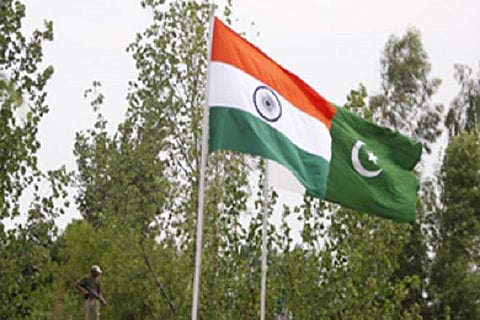

Sanjeev Srivastava
India -- under Prime Minister Narendra Modi -- crossed the line of control in more ways than one on September 29, 2016. Posterity will be a better and truer judge, but Thursday's surgical strike by our Special Forces is a game-changer both in terms of how we view ourselves and how the world sees India.
So, what has India achieved by this surgical strike?
First, as a nation we have regained our self-respect and self-esteem. Whether it was the attack on the Indian parliament, 26/11, the Mumbai train explosions, Pathankot or Uri, each time we were gripped by a sense of helplessness and hopelessness. We would wring our hands, make preparations for war, amass troops on the border, raise the issue at international fora, summon Pakistan's High Commissioner in Delhi, talk of breaking diplomatic relations... talk, talk and more talk. That's all we always did. This made us look weak, cowardly and helpless in our own eyes. The surgical strikes have rid us of that strange, almost embarrassed feeling of being emasculated as a nation.
Second, the same message has been sent to the world. There was a predictable monotony to India's reaction these past 20 years -- ever since India and Pakistan went public with their nuclear prowess. World leaders did help us hide our embarrassment by constantly advising us to practise restrain. But somewhere, there must be building a feeling of contempt towards us: That India is a soft (a softer world for cowardly) state that does not have the courage to avenge its dead.
How can we expect others to give us respect and take us seriously if our response to a hostile and aggressive neighbour is seen as timid and meek? Not once or twice but always. One cannot always be mature, pragmatic and practical. And yes, our economic might and potential has got us a seat at the high table -- but if we want to stay there and become a global power one day, we have to be seen as a country which is able to defend itself militarily.
Forget becoming a super power, this is the least one would expect from a self-respecting sovereign state.
Third, finally we have crossed the Rubicon vis-a-vis Pakistan and have called their nuclear bluff. It was sick the manner in which the Pakistani establishment used to threaten us day in and out with nuclear reprisal if we ever tried to answer them in their language. Islamabad and its band of non-state actors had figured us out very well and every action and reaction of India was taken under the shadow of this nuclear blackmail by Pakistan.
By crossing the Line of Control, India has shown it is prepared to walk the tough talk. From here on it can never be business as usual and Islamabad will have to rethink its policies. Because in one strike Delhi has junked its 20-year policy of passive, diplomatic aggression. Till now Pakistan-based terrorists and their handlers could be sure of India's response to any terror attack: There will be lot of hue and cry, upping of the ante, war talk and threats of punitive, fitting response, opinion mobilisation across the world et al, nothing will actually happen on the ground.
The surgical strikes have blown to bits this policy. Now Rawalpindi knows there will be a price to pay for its actions. So, it will be forced to rethink its strategy because Delhi's past passive approach is now off the table.
Fourth, India's retaliation is not Rambo-like, reeking of reckless bravado. In fact, the entire operation bears the stamp of maturity, subtlety and even restraint. By saying that Indian commandos targeted terror camps and terrorists waiting to cross over, Delhi has provided an exit route to the Pakistani Army. By not claiming that Pakistani troops have been worsted and humbled in this operation, India is trying to send multiple messages.
The first and most obvious one is that India will, henceforth, exercise its right to retaliate.
But the between-the-lines messaging is equally important. The tone and tenor of the briefing after the strike by Delhi was not jingoistic and chest-thumping in nature. That's why there is no international disapproval of India's action. It also gives enough room to Islamabad to get out of a tricky situation and allow for matters to calm down.
The question on everyone's mind now is: What next? Delhi has already done what it had to and said clearly that there will be no more strikes. India will most definitely not want to escalate.
So, the ball is in Pakistan's court. It has already rubbished Indian claims about the surgical strikes. It can stick to this stand and allow matters to cool down. But what if someone in Rawalpindi decides to up the ante and get adventurous? These are uncertain times there as a change of guard is due in the Pakistani Army with General Raheel Sharif's tenure ending in November.
And what if there is another terror attack on India? What will be Delhi's reaction then? And how will it impact the overall situation?
These questions are difficult to answer. What is clear is that things will never be the same again in the subcontinent after Thursday's surgical strikes.
We should aim for peace, but be prepared for all eventualities, including war.
(Sanjeev Srivastava is founder-editor of EditPlatter.com and former India Editor of BBC. The views expressed are personal. He can be contacted at sanjeevs59@hotmail.com)